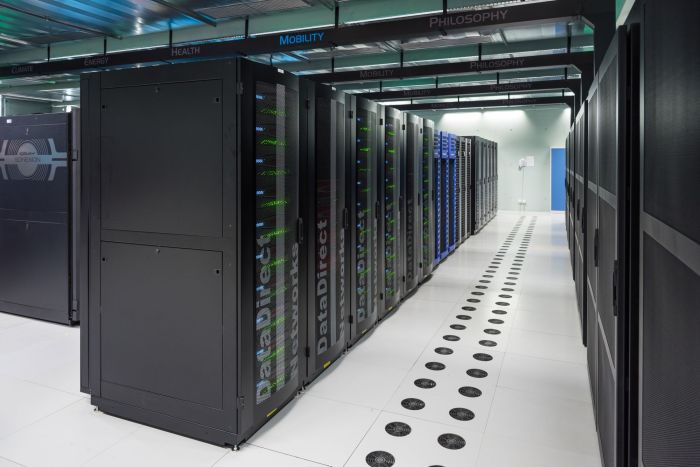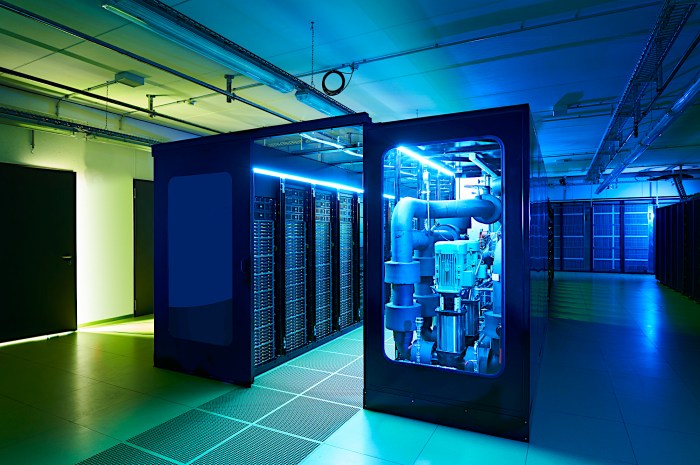Dedicated server for scientific research: computational power and data analysis – Dedicated servers for scientific research: computational power and data analysis take center stage, offering a powerful solution to the ever-increasing demands of modern scientific inquiry. The complexities of scientific research, particularly in fields like genomics, astrophysics, and climate modeling, often outstrip the capabilities of traditional computing resources.
Dedicated servers provide a robust platform, enabling scientists to tackle intricate data storage, processing, and analysis tasks with unparalleled efficiency.
These specialized servers offer significant advantages over traditional computing resources and even cloud-based solutions. Dedicated servers provide researchers with complete control over their computational environment, ensuring optimal performance and security for sensitive scientific data. They are tailored to meet the unique demands of scientific workloads, including high-throughput simulations, machine learning algorithms, and sophisticated data visualization tools.
The Need for Dedicated Servers in Scientific Research

The realm of scientific research is constantly evolving, pushing the boundaries of human understanding and unlocking the secrets of the universe. From unraveling the complexities of the human genome to predicting the impact of climate change, modern scientific inquiries demand immense computational power and vast data storage capabilities.
However, traditional computing resources often fall short in meeting these demanding requirements, hindering progress and limiting the potential of groundbreaking discoveries.
Challenges of Traditional Computing Resources
Traditional computing resources, often found in academic institutions and research labs, face limitations in handling the massive datasets and complex computations inherent in cutting-edge scientific research. The challenges include:
- Limited Processing Power:The sheer volume of data generated in fields like genomics, astrophysics, and climate modeling far exceeds the processing capabilities of standard desktop computers or shared server environments. This leads to lengthy processing times, hindering research progress and impacting the timely analysis of crucial data.
- Insufficient Storage Capacity:Scientific datasets are often massive, requiring vast storage capacity. Traditional resources struggle to accommodate the ever-growing volume of data, leading to storage limitations and potential data loss.
- Resource Contention:Shared computing resources, like university clusters, can be subject to resource contention, where multiple users compete for access to limited processing power and storage space. This can result in unpredictable performance and delays in research projects.
The Importance of Dedicated Servers in Scientific Research, Dedicated server for scientific research: computational power and data analysis
Dedicated servers provide a dedicated and optimized environment for scientific research, overcoming the limitations of traditional resources. These servers offer:
- Unmatched Processing Power:Dedicated servers are equipped with powerful processors, high-speed memory, and specialized hardware designed to handle complex scientific computations with speed and efficiency. This allows researchers to analyze vast datasets, run simulations, and conduct complex analyses without the constraints of limited processing power.
- Ample Storage Capacity:Dedicated servers provide ample storage space, allowing researchers to store and manage massive datasets without fear of running out of capacity. This ensures the integrity and accessibility of valuable research data.
- Dedicated Resources:Unlike shared environments, dedicated servers provide researchers with exclusive access to their resources, eliminating the issue of resource contention and ensuring consistent performance. This allows researchers to focus on their research without worrying about unpredictable performance or delays.
Examples of Scientific Fields Where Dedicated Servers are Essential
Dedicated servers are crucial in various scientific fields, including:
- Genomics:Genomics research involves analyzing vast amounts of genetic data to understand the complex workings of the human genome. Dedicated servers provide the computational power and storage capacity needed to process and analyze the massive datasets generated by next-generation sequencing technologies, enabling researchers to identify genetic variations, develop personalized medicine, and understand the genetic basis of diseases.
- Astrophysics:Astrophysics research involves analyzing data from telescopes, satellites, and other astronomical instruments to understand the origins and evolution of the universe. Dedicated servers are essential for processing and analyzing the massive datasets generated by these instruments, enabling researchers to identify new celestial objects, study distant galaxies, and understand the fundamental laws of physics governing the universe.
- Climate Modeling:Climate modeling involves simulating the Earth’s climate system to understand the impacts of climate change. Dedicated servers provide the computational power needed to run complex climate models, allowing researchers to predict future climate scenarios, assess the effects of human activities on the environment, and develop strategies to mitigate climate change.
Computational Power for Scientific Workloads

Scientific research often involves complex computations that require substantial processing power. Dedicated servers, with their specialized hardware and optimized configurations, provide the necessary computational muscle to tackle these demanding workloads.
Computational Requirements of Different Scientific Research Areas
Scientific disciplines have unique computational needs based on the nature of their research. Here are a few examples:
- High-Throughput Simulations:Fields like physics, chemistry, and materials science rely heavily on simulations to model and understand complex phenomena. These simulations often involve massive datasets and require high-performance computing (HPC) resources. For instance, simulating protein folding or the behavior of materials under extreme conditions can require processing power equivalent to millions of personal computers.
- Machine Learning:Machine learning algorithms, particularly deep learning models, demand significant computational resources for training and inference. Research areas like genomics, drug discovery, and image analysis utilize machine learning to analyze large datasets, identify patterns, and make predictions. For example, training a large language model like GPT-3 requires a vast amount of data and computing power, often utilizing dedicated server clusters.
- Data Visualization:Visualizing complex scientific data is crucial for understanding trends, patterns, and insights. Generating high-quality visualizations, particularly for large datasets, requires significant processing power and specialized graphics processing units (GPUs). For example, creating interactive 3D models of molecules or visualizing the distribution of galaxies across the universe demands substantial computational resources.
Dedicated Servers vs. Cloud Computing for Scientific Research
Both dedicated servers and cloud computing platforms offer solutions for scientific workloads, but they differ in their characteristics and suitability.
- Dedicated Servers:Dedicated servers provide dedicated resources, ensuring consistent performance and predictable behavior. They offer a high degree of control over hardware and software configurations, allowing researchers to fine-tune the environment to meet specific requirements. Additionally, dedicated servers provide a secure and isolated environment for sensitive research data.
- Cloud Computing Platforms:Cloud computing platforms offer scalability and flexibility, allowing researchers to access computing resources on demand. This can be advantageous for projects with fluctuating computational needs. However, cloud environments may introduce latency and potential security risks, especially for sensitive research data.
The performance of cloud resources can also vary depending on the workload and the underlying infrastructure.
Advantages of Dedicated Servers for Scientific Research
Dedicated servers offer several advantages for scientific research, particularly for computationally intensive workloads and sensitive data:
- Performance:Dedicated servers provide consistent and predictable performance, eliminating the potential for performance variations due to shared resources, as seen in cloud environments. This is critical for scientific simulations and data analysis, where accuracy and reliability are paramount.
- Control:Researchers have complete control over the hardware and software configurations of dedicated servers, enabling them to optimize the environment for their specific needs. This allows for fine-tuning resource allocation, software installations, and security settings, ensuring a tailored and secure research environment.
- Security:Dedicated servers provide a secure and isolated environment for research data, reducing the risk of data breaches and unauthorized access. This is particularly important for sensitive research data, such as patient records, financial information, or intellectual property.
Security and Data Management on Dedicated Servers

Scientific research often involves sensitive data, including confidential experimental results, personal information, and intellectual property. Ensuring the security and integrity of this data is paramount to maintain the validity and trustworthiness of research findings. Dedicated servers offer a robust platform for safeguarding scientific data, providing a controlled and secure environment for storage, processing, and analysis.
Data Security Measures on Dedicated Servers
Dedicated servers offer several security advantages over shared hosting environments, making them an ideal choice for scientific research. The dedicated nature of these servers ensures that only authorized personnel have access to the data, minimizing the risk of unauthorized access or data breaches.
This is achieved through various security measures:
- Firewall Protection:Dedicated servers are equipped with robust firewalls that act as a barrier, blocking unauthorized access from external networks. Firewalls meticulously examine incoming and outgoing network traffic, filtering out malicious attempts and ensuring only legitimate connections are allowed.
- Access Control:Dedicated servers enable granular access control, allowing researchers to define specific permissions for different users. This ensures that only authorized individuals can access and modify data, preventing accidental or intentional data corruption. Access control lists (ACLs) can be configured to restrict access to specific folders, files, or even individual data points.
- Regular Security Updates:Dedicated servers are typically managed by specialized IT teams that proactively monitor for vulnerabilities and apply necessary security updates. This ensures that the server software is kept up-to-date, mitigating the risk of exploitation by known security flaws.
- Data Encryption:Sensitive scientific data can be encrypted both at rest and in transit. Data encryption ensures that even if unauthorized access occurs, the data remains unreadable without the appropriate decryption key. Dedicated servers often provide built-in encryption capabilities or support third-party encryption tools.
Data Backup and Recovery
Data loss can be catastrophic for scientific research, potentially jeopardizing years of work and research funding. Dedicated servers provide a reliable platform for implementing robust data backup and recovery strategies. This includes:
- Regular Backups:Dedicated servers allow for automated backups to be scheduled at regular intervals, ensuring that data is regularly replicated to secondary storage locations. This provides a safety net in case of hardware failure, data corruption, or accidental deletion.
- Offsite Backup:Storing backup data in a geographically separate location provides an additional layer of protection against disasters such as fires, floods, or earthquakes. This ensures that even if the primary server is compromised, a complete copy of the data is available for recovery.
- Disaster Recovery Plan:A comprehensive disaster recovery plan Artikels the steps to be taken in the event of a major data loss incident. This plan should include procedures for restoring data from backups, restoring critical systems, and resuming research operations as quickly as possible.
Case Studies
The power of dedicated servers in scientific research is best illustrated through real-world examples. These projects showcase how dedicated servers have overcome computational and data analysis challenges, ultimately leading to significant breakthroughs and advancements in their respective fields.
Genome Sequencing and Analysis
Dedicated servers have been instrumental in advancing the field of genomics, particularly in large-scale genome sequencing and analysis projects. The Human Genome Project, a monumental undertaking to map the entire human genome, relied heavily on dedicated servers to handle the massive amounts of data generated by sequencing.
- The project generated terabytes of data, requiring high-performance computing resources for storage, processing, and analysis. Dedicated servers provided the necessary computational power to analyze the vast sequence data, identifying genes, mutations, and other genetic variations.
- The availability of dedicated servers enabled researchers to perform complex analyses, such as identifying disease-associated genes and understanding the genetic basis of various human traits.
- The insights gained from the Human Genome Project have revolutionized our understanding of human biology and paved the way for personalized medicine and gene therapy.
Closing Notes: Dedicated Server For Scientific Research: Computational Power And Data Analysis
The utilization of dedicated servers in scientific research empowers researchers to push the boundaries of discovery. By providing the computational muscle and data management capabilities necessary to handle complex scientific datasets, these servers accelerate research progress, leading to breakthroughs in various fields.
From unraveling the mysteries of the universe to understanding the complexities of human biology, dedicated servers play a crucial role in advancing scientific knowledge.